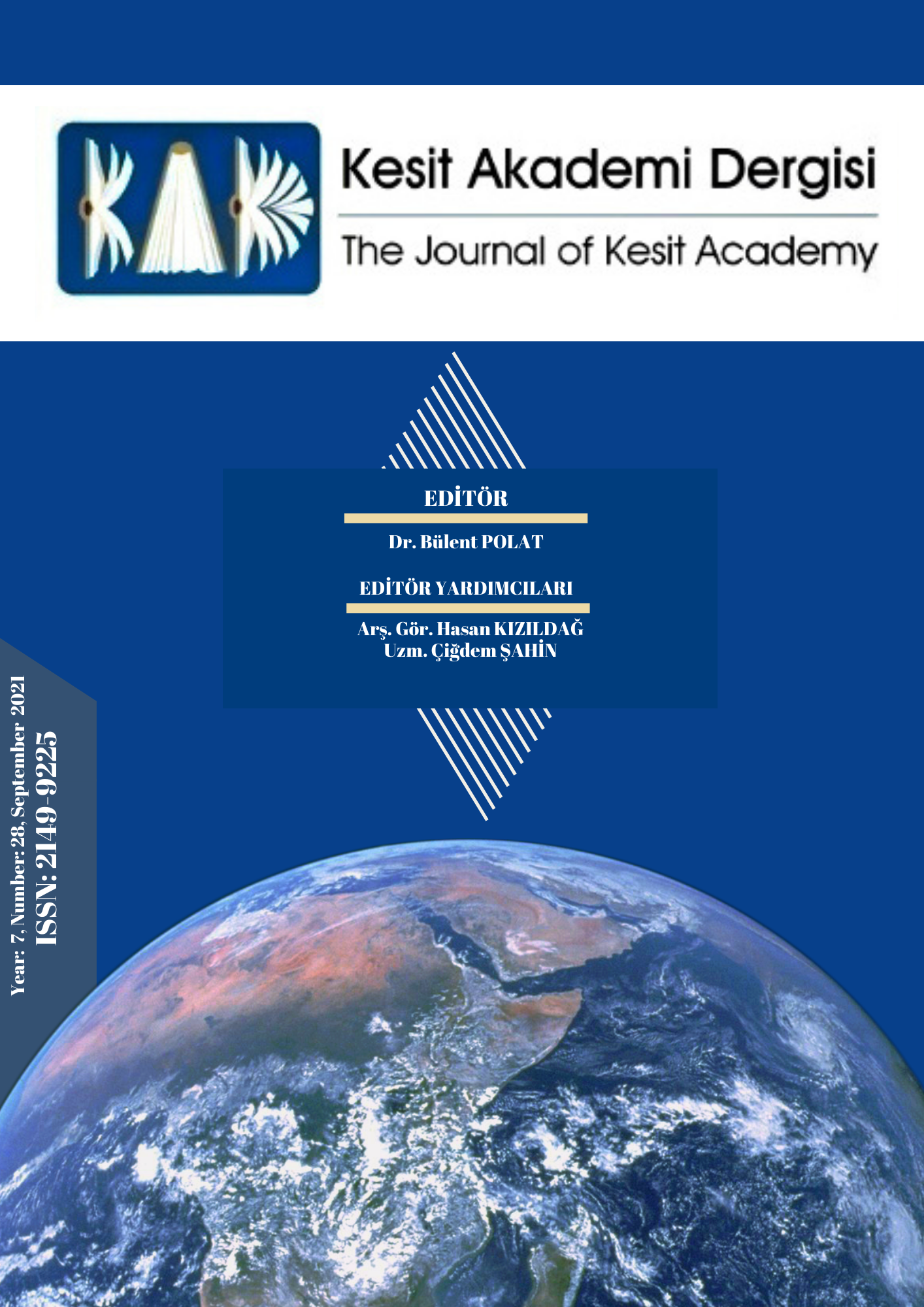Author :
Abstract
Eğitim öğretim süreçlerinin temel taşıyıcısı ders kitaplarıdır. Ders kitapları bünyesinde yer alan müfredat ögeleri akademik ve kültürel yetkinliği sağlarken kullanılan metinler ve metinlerin söz varlığı hedef kitlenin iletişim becerileri, temel dil becerileri, ifade becerileri açısından yetkinliği sağlamaktadır. Nitel yaklaşım benimsenerek betimsel tarama modelinde yürütülen bu araştırmada da MEB onaylı 8. sınıf Türkçe ders kitabında yer alan okuma metinlerinin söz varlığı derlem dilbilim alanında kullanılan bir yazılımla incelenmiş, istatistik tabanlı veriler elde edilmiştir. Araştırmanın veri seti incelendiğinde ders kitabının söz varlığının zengin olduğu; farklı kelime kullanımının yeterli düzeyde olduğu saptanmıştır. Araştırmanın ikinci aşamasında son yıllarda giderek artan derlem tabanlı çalışmalardan hareketle Türkçe üzerine yapılandırılan Türkçe Ulusal Derlemi ve TS CORPUS derlemi sıklık listeleri sürece dâhil edilmiştir. Her iki derlemden elde edilen sıklık listeleri ile ders materyalindeki okuma metinlerinden elde edilen sıklık listeleri ile kıyaslanmıştır. Türkçede en sık kullanılan 1000 kelimenin baz alındığı bu kıyaslama neticesinde ders materyalinin söz varlığında ortak kelime sayısı Türkçe Ulusal Derlemi verilerine göre 433; TS Corpus Derlemi verilerine göre ise 395 olarak saptanmıştır. Türkçede en sık kullanılan 1000 kelime açısından tespit edilen ortaklık düzeyinin yeterli durumda olduğu görülmüştür. Hedef kitlenin temel dil becerileri, ifade becerileri, iletişim becerileri açısından ders materyallerinin söz varlığının sezgisel yöntemler yerine derlem tabanlı yaklaşımlarla yürütülmesi gerektiği vurgulanmıştır.
Keywords
Abstract
The main carrier of educational processes is textbooks. While the curriculum elements in the textbooks provide academic and cultural competence, the texts used and the vocabulary of the texts provide competence in terms of communication skills, basic language skills, and expression skills of the target audience. In this research, which was carried out in a descriptive survey model by adopting a qualitative approach, the vocabulary of the reading texts in the 8th grade Turkish textbook approved by the Ministry of Education was examined with a software used in the field of corpus linguistics, and statistics-based data were obtained. When the data set of the research is examined, it is seen that the vocabulary of the textbook is qualified; It was determined that the use of different words was sufficient. In the second phase of the study, the frequency lists of the Turkish National Corpus and TS CORPUS corpus, which were structured on Turkish, were included in the process, based on the increasing number of corpus-based studies in recent years. The frequency lists obtained from both corpuscles were compared with the frequency lists obtained from the reading texts in the course material. As a result of this comparison based on the 1000 most frequently used words in Turkish, the number of common words in the vocabulary of the course material is 433 according to the Turkish National Corpus data; According to the TS Corpus Corpus data, it was determined as 395. It was seen that the level of partnership determined in terms of the 1000 most frequently used words in Turkish was sufficient. It was emphasized that the vocabulary of the course materials in terms of basic language skills, expression skills, and communication skills of the target audience should be conducted with corpus-based approaches rather than intuitive methods.
Keywords
- Aksan, D. (2002). Anadilimizin söz denizinde. Bilgi Yayınevi
- Aksan, Y., Aksan, M., Mersinli, Ü. ve Demirhan, U. U. (2017). A frequency dictionary of Turkish. Routledge.
- Baş, B. (2010). Söz varlığının oluşumu ve gelişiminde çocuk edebiyatının rolü. Türklük Bilimi Araştırmaları, 27(27), 137-159.
- Eselioğlu, H., Set, S. ve Yücel, A. (2019). Ortaokul ve imam hatip ortaokulu Türkçe 8 ders kitabı. Millî Eğitim Bakanlığı Yayınları
- Karasar, N. (2009). Bilimsel araştırma yöntemi. Nobel Yayınları
- Karadağ, Ö. (2019). Aynı Sınıf düzeyi için hazırlanan Türkçe ders kitaplarının ortak sözvarlığı açısından karşılaştırılması. Ana Dili Eğitimi Dergisi, 7(4), 1130-1140.
- Kurudayıoğlu, M. (2011). Türkçe öğretmeni adaylarının sözlü anlatımlarının düşünceyi geliştirme teknikleri açısından incelenmesi. TÜBAR, 29, 213-226.
- Kurudayıoğlu, M., ve Karadağ, Ö. (2006). Ortak kelime hazinesi kazandırmada ilköğre- tim sekizinci sınıf Türkçe ders kitaplarının durumu. Ahi Evran Üniversitesi Kırşehir Eğitim Fakültesi Dergisi, 7(2), 335-343.
- MEB (2019). Millî Eğitim Bakanlığı Türkçe dersi (1-8. Sınıflar) öğretim programı. Ankara: MEB Yayınları
- Onan, B. (2016). Söz varlığı terminolojisi üzerine bir analiz çalışması. Millî Eğitim Söz Varlığı Özel Sayısı, 45(210). 11-29
- Sezer, B. ve Sezer, T. (2013). TS corpus: herkes için Türkçe derlem. In Proceedings of the 27th national linguistics conference. 217-225.
- Şimşek, R. (2020). Derlem tabanlı bir çalışma: 7. sınıf Türkçe ders kitaplarının söz varlı- ğı. Çukurova Araştırmaları, 6(1), 231-243.
- TDK. (2010). Türkçe sözlük. TDK Yayınları.





